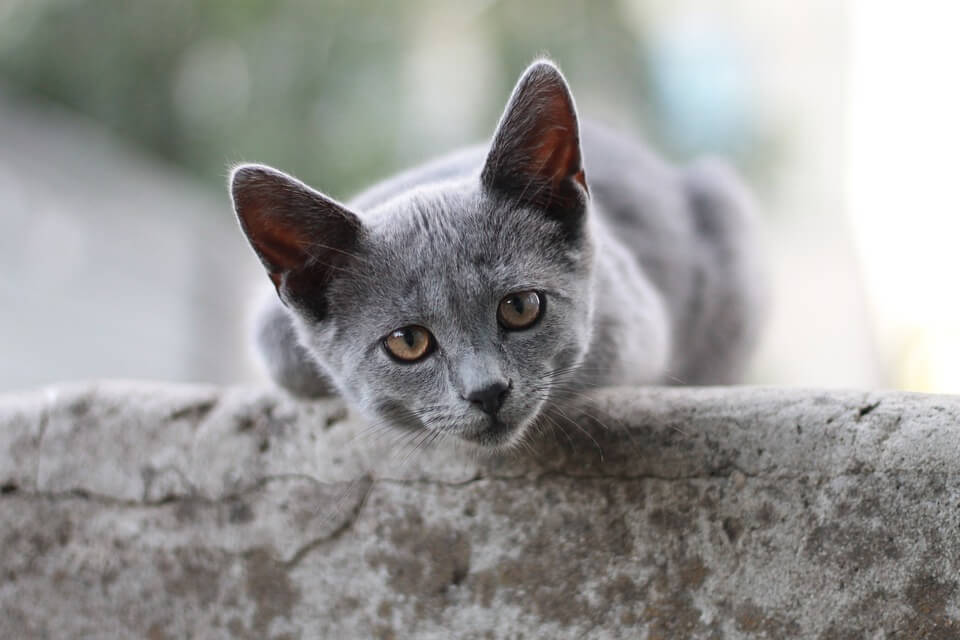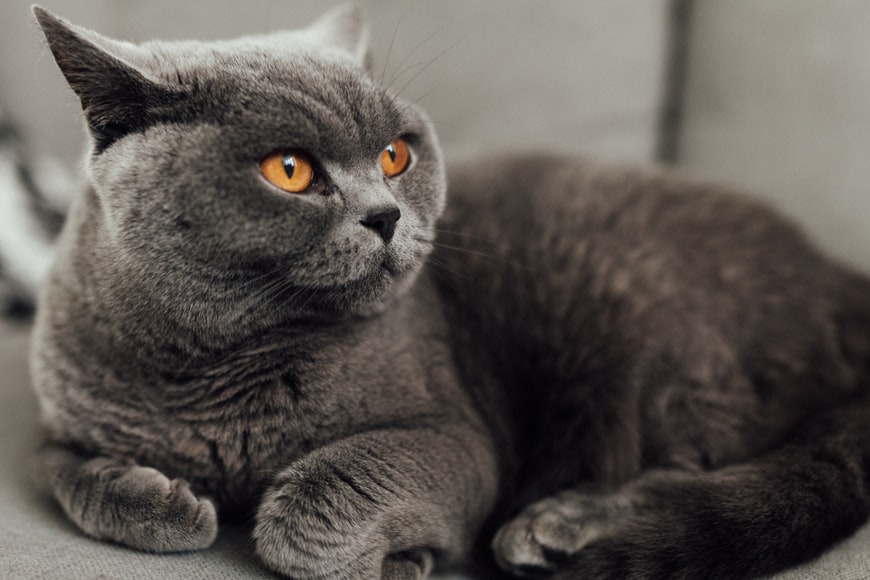British Shorthair Cat
The British Shorthair is one of the most popular global cat breeds. While not very affectionate, the British Shorthair gets along with just about everyone. You'll be taken in by the British Shorthair's charming demeanor and round features with just one look. This is one of the oldest English cat breeds, and his peaceful, quiet demeanor has earned him a place in homes and hearts throughout the United Kingdom and beyond. British shorthairs are excellent family cats and like spending time with their owners; however, they may frown upon being handled or hugged excessively.
Weight
- Male: 9-17 lbs
- Female: 7-12 lbs
Height
- Male: 12- 14 inches
- Female: 12-14 inches
Lifespan
- 14-20 years
Appearance

The roundness of the British Shorthair is a study in itself. His head is big, eyes are round, and paws are rounder. His tail, too, has a rounded tip.
The British Shorthair is a strong cat that ranges from medium to big. They have a lot of muscle and a lot of boning. Their figure is rounded and thick. All aspects of this breed distinguish what a strong cat should be. The British Shorthair is characterized by a wide chest, muscular neck, powerful jaws, and a well-developed snout. Legs are thick and powerful.
His short, fluffy coat was known as the British Blue because it was only available in that hue, but today it comes in various colors and designs. A longhaired variant known as the British Longhair is also available. The British Longhair is identical to the British Shorthair but for his coat.
Temperament
British shorthairs have a disposition that is hard to beat: they're energetic without being noisy, loving without being cloying, and clever without feeling the need to show. British shorthair cats are calm and, if socialized as kittens, will treat everyone in the household (including dogs and other cats) as a good friend.
They like being petted but aren't demanding about it. During the day, they will likely follow you around your home, settling near wherever you stop. They thrive on attention, but they also cherish their privacy and may scoff at being held or hugged excessively. They don't like being carried around because they are large cats.
This is an active cat. He's active when he's a kitten, but by the time he's a year old, he's generally settled down. He is intelligent and will love playing with toys, especially if they are interactive.
The British Shorthair is a clever cat, despite his laid-back demeanor. Teach him tricks and provide him with puzzle toys that will reward him with kibble or treats as he learns how to use them to keep his brain challenged and interested in life.
Living conditions

British shorthairs, like other cats, aren't picky about where they reside as long as they have loving owners who spend time with them. British shorthairs enjoy a nice balance between life and wanting to laze about in the sun all day. This means he'll always be up for a game of chase-the-little-red-laser-beam while you're at work, but you won't have to worry about him getting in trouble (especially if you provide him with plenty of toys to keep them occupied.
Because British Shorthairs are prone to gaining weight, a well-balanced diet and regular exercise are essential for their overall well-being and long-term health. They will explore safe settings and are equally at home playing indoors or outdoors, especially if there are plenty of toys and frames to play on. They are clever cats who need to be adequately stimulated; however, appropriate rest and sleeping places are also necessary.
Care

Because British Shorthairs don't shed a lot, weekly brushing is usually plenty. They do, however, shed seasonally in the spring and fall, so your cat may require more grooming at those times. The British Shorthair's short, silky coat is easy to clean, and dead hairs may be removed regularly by brushing or combing. It's uncommon that they will need to take a bath.
Periodontal disease may be avoided by brushing their teeth. Daily oral hygiene is ideal but brushing once a week is preferable to nothing. Weekly nail trims are recommended. To eliminate any discharge, use a soft, wet cloth to wipe the corners of your eyes. To avoid the danger of transmitting infection, use a different portion of the towel for each eye. Establishing a grooming regimen for your cat at an early age will help it get accustomed to being groomed.
Establishing a grooming regimen for your cat at an early age will help it get accustomed to being groomed.
Health
Unfortunately, the cat breed has health problems.The British Shorthair is no exception, despite its usually good health. As previously said, this breed is prone to obesity, which can lead to diabetes, so make sure your cat is at a healthy weight.
Hypertrophic Cardiomyopathy is the most prevalent kind of heart illness in cats, and Shorthairs are more prone to it than other breeds. Check to see if your cat has lost appetite, appears tired, or has trouble breathing. Scans may be needed to confirm the diagnosis, resulting in hospitalization.
British Shorthairs are susceptible to hyperthyroidism. It occurs when the thyroid glands produce an excessive amount of thyroid hormone. Sickness, an upset stomach, weight loss while being continuously hungry, and a greasy coat are early indications. A benign tumor frequently causes it in the thyroid gland. Surgery and follow-up medications are frequently the best options.
British Shorthairs can get cystitis (feline lower urinary tract illness), which is typically caused by infection or the formation of bladder stones. Medication and a particular medical diet may be used as part of the treatment.
They are susceptible to chronic renal illness. It is possible to live a normal, happy life with a chronic kidney condition, but this typically necessitates long-term medication and frequent appointments to the veterinarian.
Shorthairs can survive into their adolescent years. This is fantastic, but you want to ensure your kitty lives a long and happy life. Insurance can make it simpler to ensure that your Shorthair receives the care they require when they are most in need.
History

The British Shorthair is one of oldest English cat breeds, with Roman origins. When the Romans conquered England during their empire's development, it appears that they took cats with them to safeguard their food supply from rats. For ages, the cats invaded the region and were popular street cats.
Harrison Wier, a British man, is regarded with becoming the first cat breeder in the late 1800s. He is credited with domesticating the ordinary British street cat and developing the British Shorthair through a breeding program and selective crossbreeding.
During the difficult economic times of World War II, the breed was on the verge of extinction. To ensure their survival after WWII, the remaining lineages were mixed with other breeds like the Domestic Shorthair, Russian Blue, and Persian strains.
The American Cat Association was the first breed registry to approve the British Shorthair in 1967. The International Cat Association and the Cat Fanciers Association followed suit in 1979 and 1980.
Final Thoughts
Every cat breed has advantages, and the British Shorthair is no exception. They stand out from the crowd when expressing their love and care for their family. They vary from other breeds in that they have various ways of expressing affection. If you get one, you'll develop a relationship with the cat that will last its entire life if you appreciate how they express and accept affection.








Comments